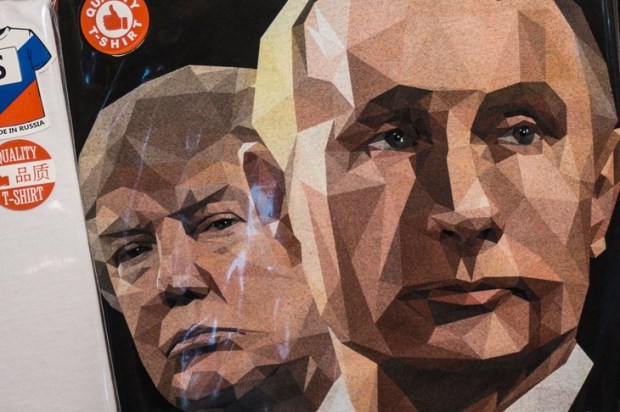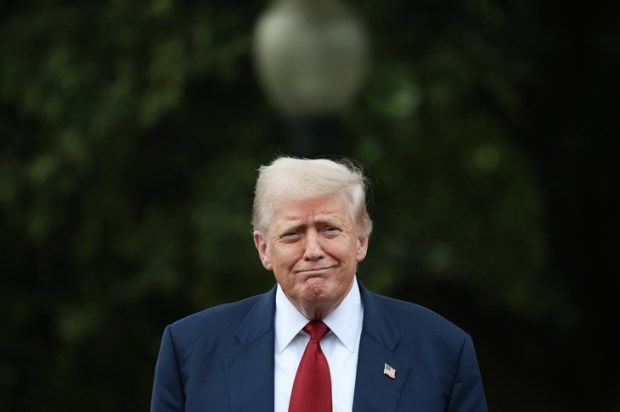Kevin Rudd was left barking up the wrong tree this week when he collared a tax to Bluey’s neck.
‘I don’t think we want to see a tax on Bluey. What happens if we all lock down our countries with competitive, punitive arrangements against each other’s movies? Movies are the way in which we kind of understand each other more. So I’d be all for opening this up,’ said Mr Rudd.
Rudd’s vivid image, conjured during his remarks to the Milken Institute Global Conference, was prompted by Donald Trump’s proposed ‘100 per cent tariff’ on films produced outside of the United States. The suggestion, posted to Truth Social by the President, inspired alarm, especially throughout Australia’s $20.2 billion screen industry.
Trump is, to employ the internet vernacular of my contemporaries, a troll. Constant, calculated unpredictability has afforded him success in business and politics alike.
For this reason, his words, whether written or spoken, cannot be taken at face value. We would be better placed to interpret the President’s proposed film tariff, itself supported by both industry groups and entertainment unions, as not a concrete threat but a broader sentiment.
Trump wants to reincentivise American domestic film production. Presumably, his motivations are economic, not cultural.
Then again, this is a man who now serves as the Kennedy Centre’s chairman and who, during his first term, ordered that new federal buildings must ‘uplift and beautify public spaces’.
The President of the United States is under no obligation to govern in a manner that accommodates other nations’ commercial interests. Trump’s political mandate, after all, is granted to him by the American people, not the Australian screen industry.
At the heart of that industry, and Australia’s arts generally, is a kind of confused protectionism. On the one hand, governments heavily and conditionally subsidise our cultural institutions, irrespective of local consumer demands. On the other, so many of us, including those same governments, suffer from cultural cringe.
Our film sector is further beleaguered by its dependence upon international capital. While foreign productions are enticed to our shores by generous federal and state tax offsets, the Australian Film Commission confessed, some 20 years ago and after surveying Hollywood producers, that little more than Australia’s exchange rate kept it competitive.
Governments’ hundreds of millions might be better spent establishing an environment in which authentic Australian creators can produce lasting, quality Australian cinema, rather than reeling in flavour-of-the-month Disney blockbusters.
In any case, Labor’s 2023 national cultural policy, Revive, had pledged local content quotas for streaming platforms well before Trump took to Truth Social. Among others, the Media Entertainment and Arts Alliance is campaigning for 20 per cent of global streaming services’ Australian gross revenue to be reinvested locally.
Our parallel import restrictions on books, a construct of the Hawke government, has blatantly protected local publishers since 1991.
If we are content to implement and perpetuate these measures ourselves, we might at least have the maturity to rationalise the American perspective.
Like it or not, Trump excels in exposing other nations’ insecurities. As I have previously argued in this masthead, Australia has long suffered from a cultural malaise.
In 1965, Joan Sutherland was arriving at Sydney Airport. Reporters instantly inundated her. ‘Why have you been away from Australia for so long?’ one demanded, thrusting forward a microphone.
By now, after 14 triumphant years abroad, Sutherland was a superstar, having conquered London, Milan, and New York. Amused, she retorted, ‘I’ve been rather busy.’
Dame Joan could recognise that the wider world offered her more opportunity than her own country. Today, inflated arts bureaucracies, an unimaginative political class, and a collapsed education system ensure that her predicament remains ours.
We should not accept this. Courageous, independent artists, supported by a visionary private sector, must dare to imagine and then build Australia’s cultural future. Indeed, it was artists and investors, not governments, who built Hollywood.
Local filmmakers must appropriate the disruptive entrepreneurship of their foreign competitors. America’s emerging Angel Studios, for instance, finances each of its productions through community-driven equity crowdfunding. Receiving no public money, the company’s revenue surged from US$77 million in 2022 to over US$202 million in 2023.
And, critically, let us not forget our past achievements. Both Crocodile Dundee and The Castle were shot, produced, and distributed with little more than investors’ capital. Both films grossed multiples of their budgets at the Australian box office alone and have sustained their reputation as quality artworks.
Whether or not the United States implements its film tariff, this week has shed further light upon the fragility of Australia’s arts. That fragility is not Donald Trump’s to remedy.
Alexander Voltz is a composer and founding music editor of Quadrant.

























